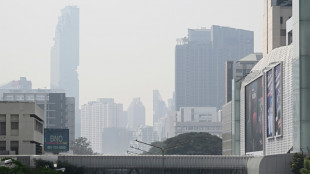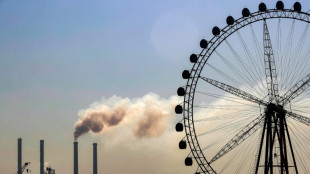
-
 Zverev defends injured Djokovic after Australian Open boos
Zverev defends injured Djokovic after Australian Open boos
-
Bank of Japan hikes interest rate to 17-year high, boosts yen

-
 Aryna Sabalenka: the complete player in search of history
Aryna Sabalenka: the complete player in search of history
-
Madison Keys: from teenage prodigy to Melbourne finalist at 29

-
 Sabalenka, Keys promise thunderous slugfest in Australian Open final
Sabalenka, Keys promise thunderous slugfest in Australian Open final
-
Catalonia eyes reversal of business exodus after big bank returns

-
 Hong Kong revives border village in alternative tourism push
Hong Kong revives border village in alternative tourism push
-
Coquard wins Down Under photo finish as Romo retains tour lead

-
 Tajikistan launches crackdown on 'witchcraft' and fortune-telling
Tajikistan launches crackdown on 'witchcraft' and fortune-telling
-
Djokovic unsure if Murray partnership will go on after Melbourne exit

-
 Deadly teen knife crisis UK's 'new normal'
Deadly teen knife crisis UK's 'new normal'
-
LeBron, Davis lead Lakers romp over Celtics

-
 Sumo walks 'tightrope' with first overseas events in 20 years
Sumo walks 'tightrope' with first overseas events in 20 years
-
Djokovic retires hurt to send Zverev into Australian Open final

-
 Farrell 'still finding out' about 'intriguing' France at Racing
Farrell 'still finding out' about 'intriguing' France at Racing
-
Taekwondo star Hamidi sacrifices her freedom to battle the Taliban

-
 Misfiring Kane needs to shake off slump as Bayern visit Freiburg
Misfiring Kane needs to shake off slump as Bayern visit Freiburg
-
Bank of Japan hikes interest rate to 17-year high, signals more

-
 Barca hoping to end torrid Liga form against improving Valencia
Barca hoping to end torrid Liga form against improving Valencia
-
Man City start tough run against Chelsea, Spurs aim to halt slide

-
 Lyon fight for return to Champions League amid off-field worries
Lyon fight for return to Champions League amid off-field worries
-
Bangkok air pollution forces 352 schools to close

-
 Asian markets build on Trump rally, yen climbs after BoJ cut
Asian markets build on Trump rally, yen climbs after BoJ cut
-
Despite truce, Lebanese from devastated Naqura cannot go home

-
 Tax change sows anger on England farms
Tax change sows anger on England farms
-
Peers and Gadecki win Australian Open mixed doubles

-
 'I rip out my lashes to ease pain': Eye disease afflicts Ethiopia
'I rip out my lashes to ease pain': Eye disease afflicts Ethiopia
-
Survivors strive to ensure young do not forget Auschwitz

-
 Asian markets build on Trump rally, yen steady ahead of BoJ
Asian markets build on Trump rally, yen steady ahead of BoJ
-
'Nerve-racking': Inside the aerial battle to tame Los Angeles fires

-
 Ice in the sky: Thailand's fight against air pollution
Ice in the sky: Thailand's fight against air pollution
-
Climate change cooks up Japanese 'cabbage shock'

-
 Smog chokes Baghdad as oil-fired factories belch out smoke
Smog chokes Baghdad as oil-fired factories belch out smoke
-
Strong winds wreak havoc before Torrey Pines 2nd rd halted

-
 'Living in a cage': West Bank checkpoints proliferate after Gaza truce
'Living in a cage': West Bank checkpoints proliferate after Gaza truce
-
OpenAI unveils 'Operator' agent that handles web tasks

-
 Bamboo farm gets chopping for US zoo's hungry new pandas
Bamboo farm gets chopping for US zoo's hungry new pandas
-
Fear in US border city as Trump launches immigration overhaul

-
 Red herring: Why Trump wrongly blames a fish for LA wildfires
Red herring: Why Trump wrongly blames a fish for LA wildfires
-
Colman kicks off Sundance as film world reels from LA fires

-
 Alien hunting? Look under sea, says Republican congressman
Alien hunting? Look under sea, says Republican congressman
-
242 mn children's schooling disrupted by climate shocks in 2024: UNICEF

-
 Washington's 'Terminator' Daniels one win away from NFL history
Washington's 'Terminator' Daniels one win away from NFL history
-
US Republicans pressure Democrats with 'born-alive' abortion bill

-
 Djokovic faces Zverev semi-final test in pursuit of 25th Slam title
Djokovic faces Zverev semi-final test in pursuit of 25th Slam title
-
Trump says will demand interest rates drop 'immediately'

-
 Man Utd should never get used to losing, says Fernandes
Man Utd should never get used to losing, says Fernandes
-
Colombia asks Venezuela to help quell border violence

-
 Wembanyama dazzles Paris crowd as he leads Spurs to easy win
Wembanyama dazzles Paris crowd as he leads Spurs to easy win
-
Trump Davos address lifts S&P 500 to record, dents oil prices


Bank of Japan hikes interest rate to 17-year high, signals more
The Bank of Japan hiked interest rates on Friday to their highest level in 17 years and signalled more were in the pipeline despite fears of turmoil under US President Donald Trump.
The well-flagged 25-basis-point increase to 0.5 percent comes as economic data indicates the world's fourth-biggest economy was developing in line with the policymakers' expectations and follows another bumper reading on inflation.
The move, which leaves borrowing costs at the highest since 2008, was underpinned by healthy underlying inflation, firms "steadily" raising wages and financial markets being "stable on the whole", the BoJ said in a statement.
"Japan's economic activity and prices have been developing generally in line with the Bank's outlook, and the likelihood of realising the outlook has been rising," it said.
If its outlook is met, "the bank will accordingly continue to raise the policy interest rate and adjust the degree of monetary accommodation", it added.
The news, and expectations for more hikes in the future, saw the yen strengthen to 155.20 per dollar -- from 156.3 earlier -- having weakened in recent months following Trump's election and bets the Federal Reserve will slow down its interest rate cut campaign this year.
Even as other central banks have raised borrowing costs in recent years, the BoJ has remained an outlier, maintaining an ultra-loose stance in an attempt to spark growth and inflation.
But it concluded last March that Japan's "lost decades" of economic stagnation and static or falling prices were over, finally lifting rates above zero, where they had been for more than a decade in a bid to kickstart inflation and growth.
The March increase -- which was the first since 2007 -- was followed by another in July that caught investors off guard and sparked turmoil in global equity and currency markets.
This time, BoJ chief Kazuo Ueda prepared markets for an increase -- some 75 percent of economists expected one -- and the reaction was more muted on Friday.
- Trump tariffs -
"With no market turbulence after Trump's inauguration," conditions for the BoJ to hike its policy rate have been met, Ko Nakayama, chief economist of Okasan Securities Research, said before the announcement.
"Raising just 25 basis points to 0.5 percent won't cool the economy," he said before the decision was announced.
There are, however, concerns among Japanese companies that Trump could throw a spanner into the works by imposing huge tariffs on imports from key trading partners, which many economists warn could drive up inflation.
Japan's economic growth slowed in the July-September quarter, partly because of one of the fiercest typhoons in decades and warnings of a major earthquake, which did not materialise.
"The Bank of Japan is dialling back monetary policy support despite the poor run of economic data. The weak yen is a key reason," Moody's Analytics said in a note.
Data released Friday showed that headline Japanese inflation hit 3.6 percent in December, or 3.0 percent adjusted for food prices, up from 2.7 percent in November.
The core reading remained above the BoJ's two-percent inflation target, which it has surpassed every month since April 2022.
The BoJ on Friday also raised its inflation forecast for fiscal 2024 -- running to March 31, 2025 -- to 2.7 percent from 2.5 percent previously.
For fiscal 2025 it now expects inflation of 2.4 percent and 2.0 percent in 2026 -- both up from 1.9 percent previously forecast.
Marcel Thieliant at Capital Economics said inflation was set to remain above the BoJ's objective "for a while yet".
As a result "we're sticking to our forecast that the policy rate will reach an above-consensus 1.25 percent by the end of next year", Thieliant said before Friday's announcement.
kh-nf-jug-stu/dan
Y.Baker--AT
